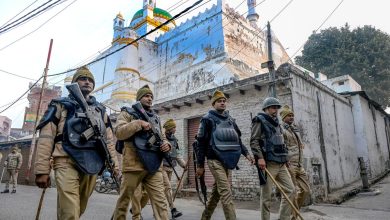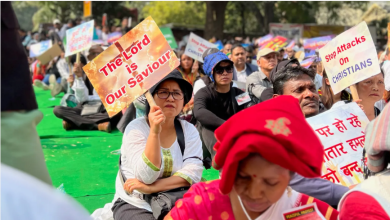Growing pattern of censorship– Modi regime blocks access to Hindutva Watch, India Hate Lab
Move meant to control narrative in view of history of crackdowns on news outlets in IIOJK: Al Jazeera Report
 New Delhi: The Indian government has blocked access to the websites of Hindutva Watch and India Hate Lab, independent research projects based in the United States that meticulously document hate crimes against religious minorities in India.
New Delhi: The Indian government has blocked access to the websites of Hindutva Watch and India Hate Lab, independent research projects based in the United States that meticulously document hate crimes against religious minorities in India.
According to Kashmir Media Service, the move comes just ahead of the general elections scheduled in India for April-May 2024.
Al Jazeera reports that Hindutva Watch founder Raqib Hameed Naik received communication from the Ministry of Electronics and Information Technology (MEITY) last week under the Information Technology (IT) Act, warning of potential blocking. The websites, known for their extensive coverage of hate crimes, were officially blocked under section 69A of the controversial IT Act, citing concerns about the “interest of sovereignty, integrity, and security” of India.
Naik, a Kashmiri journalist residing in the U.S. since 2020, launched Hindutva Watch in April 2021. The platform, which boasts 12 volunteers across five countries, has become a rare database documenting hate speech and violence against religious minorities in India. The project has reported an alarming increase in hate events, almost double the incidents documented a year ago.
The blocking of the websites follows the recent restriction of Hindutva Watch’s account on X (formerly Twitter) in India, a move ordered by the government under the IT Act. Critics argue that these actions reflect a growing pattern of censorship and suppression of free press and critical voices.
India Hate Lab, another initiative dedicated to tracking hate speech in the country, has also faced the same fate, with both platforms still accessible outside of India. Naik has revealed that he is exploring legal options in response to the blocking of the websites.
The Indian government’s use of the IT Act has raised concerns about freedom of expression and access to information. Section 69A empowers authorities to block public access to information in the interest of national security. However, this move has faced criticism, especially in light of the Supreme Court of India’s 2022 decision to strike down another section of the IT Act that allowed the government to prosecute individuals for sending “offensive” messages online.
Al Jazeera reached out to India’s IT ministry for comments but has not received a response. The blocking of Hindutva Watch’s website in India aligns with a broader trend of increased censorship in the country, as evidenced by the decline in India’s ranking in the 2023 World Press Freedom Index, dropping to 161 out of 180 countries.
Critics argue that the suppression of independent voices and documentation of hate crimes could have serious implications for the democratic functioning of India, particularly with the upcoming national elections. Some see it as an attempt to stifle dissent and control the narrative, especially considering the history of crackdowns on independent news outlets and journalists in regions like Kashmir.
As Hindutva Watch and India Hate Lab become the latest casualties in a series of restrictions on information dissemination, questions are raised about the government’s commitment to transparency and the potential impact on the democratic process in India. The situation also highlights the challenges faced by those attempting to monitor hate crimes and speech in a climate where independent viewpoints are increasingly under threat.








